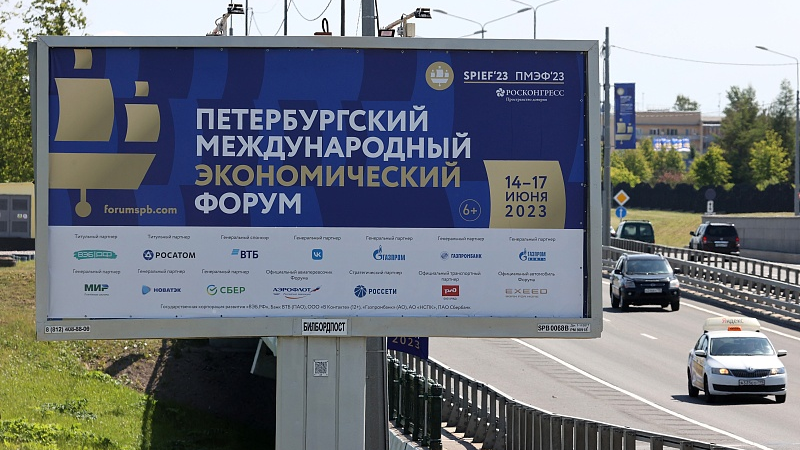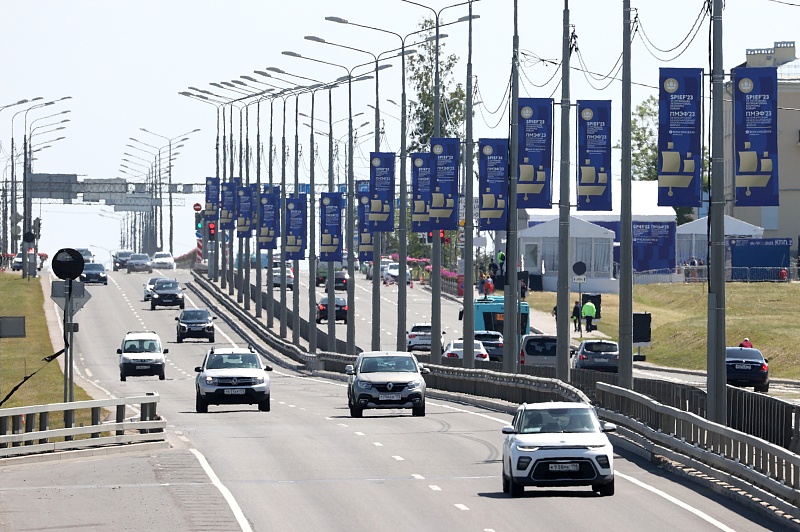
A billboard poster promoting the 2023 St. Petersburg International Economic Forum, St. Petersburg, Russia, June 12, 2023. /CFP
A billboard poster promoting the 2023 St. Petersburg International Economic Forum, St. Petersburg, Russia, June 12, 2023. /CFP
Editor's note: Anthony Moretti, a special commentator on current affairs for CGTN, is an associate professor at the Department of Communication and Organizational Leadership at Robert Morris University. The article reflects the author's opinions and not necessarily those of CGTN.
The 26th annual St. Petersburg International Economic Forum (SPIEF) takes place this year from June 14-17. The gathering of representatives from almost six-dozen countries comes at an important time. The U.S. and European economies look increasingly weak, even though their commitment to punishing Russia and marginalizing China seems indefatigable. And growing questions will be addressed at the forum relating to whether Russia and other nations ought to more carefully consider independence from the U.S. dollar.
Meanwhile, China and Russia are becoming increasingly important trade partners, with one U.S. news agency suggesting "China now accounts for nearly a third of all Russian exports, and Russia recently became China's top oil supplier." Let us not ignore that Chinese President Xi Jinping and Russian President Vladimir Putin declared they intend to have their countries "steadily increase the proportion of local currency settlement," which means the Chinese yuan – not the U.S. dollar – will become more relevant in China-Russia trade.
The Washington Post astutely noted recently that "Washington's weaponizing of the dollar over the past decade" through economic sanctions has led the leaders of multiple countries to examine whether they should seek to finance trade separate from the dollar.
One analyst told the newspaper there is no doubt "the dollar has been weakening rather than strengthening" in recent months. If this were to continue, America would be far less able to slap sanctions on nations it dislikes. Viewed another way, its ability to dictate how the global financial system runs – and which nations and specific citizens can engage in that system – would be increasingly under stress.
Russia will host six bilateral meetings during the forum with representatives from ASEAN, China, India and Latin America. These conversations are likely to center around Russian efforts to expand economic (and perhaps political) cooperation with these nations and regions of the world.
Keep in mind that in April, the annual ASEAN-Russia Senior Officials Meeting took place in Cambodia. Russia benefits from such associations because the country can expand trade opportunities; the ASEAN nations benefit because they gain access to Russia's aforementioned energy market.
Alexander Ivanov, Russia's ambassador to ASEAN, recently wrote that his country is "an indispensable actor" in South Asia because it refuses to lecture any ASEAN nation on its domestic politics as conversations about technology, security, tourism and other issues take place.
Meanwhile, Russian Foreign Minister Sergei Lavrov advanced Russia's belief that the West's hold over global power is eroding and said in an article for the Razvedchik that the formation of a more equitable multipolar world order is underway.
Russia contends that the "logical response to the crisis of the world order is the strengthening of cooperation between the states that are subject to external pressure" [from the West].

Flags promoting the 2023 St. Petersburg International Economic Forum are pictured by a street, St. Petersburg, Russia, June 12, 2023. /CFP
Flags promoting the 2023 St. Petersburg International Economic Forum are pictured by a street, St. Petersburg, Russia, June 12, 2023. /CFP
One other event that is sure to draw plenty of attention at the SPIEF is a panel scheduled for June 15 titled "Dedollarization: The Future of Money." The conference program notes that the "freezing of Russian reserves has transformed reserve currencies into geopolitical weapons, casting a shadow over the stability of settlements with trading partners in U.S. dollars susceptible to Washington's ability to impede transactions deemed suspicious. Consequently, global economic trust in the U.S. currency wanes, prompting a surge in de-dollarization."
The panelists undoubtedly will acknowledge that the U.S. continues to seek the suffocation of Russia through economic sanctions and by sending billions of dollars in arms to Ukraine. The U.S. Department of the Treasury reports that over 300 different economic sanctions have been leveled against Russia.
And yet the BBC recently reported that Western leaders had predicted "Russia's economy would collapse" because of the intensity of the sanctions, however "the International Monetary Fund [IMF] believes Russia's economy could grow by 0.7 percent in 2023."
There would be quite an irony if the IMF's analysis is true. Earlier, I mentioned the turbulent U.S. and European economic forecasts. Americans were reminded just the other day that a recession in the second half of 2023 is likely, and Europe might already be in one.
(If you want to contribute and have specific expertise, please contact us at opinions@cgtn.com. Follow @thouse_opinions on Twitter to discover the latest commentaries in the CGTN Opinion Section.)